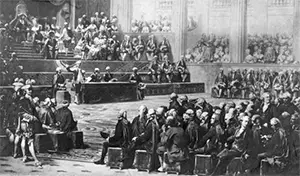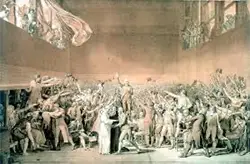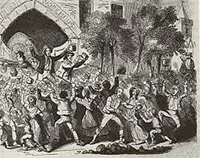The National Constituent Assembly of France
Part 1: Origins and Controversies The National Constituent Assembly was effectively the legislature of France for two years during the early stages of the French Revolution. 
King Louis XVI, in the throes of a dispute with not only the parlement, but also much of the nobility, in 1788 summoned the Estates-General in order to (he hoped) approve a set of monetary reforms that had otherwise been rejected. The king, in an effort to keep the clergy and nobility in the fold, agreed that the meetings would take place under traditional arrangements, as set out in the structure of the Ancien Régime. Such arrangements clearly favored members of the First Estate (clergy) and the Second Estate (nobility) but disadvantaged the members of the Third Estate (peasants). Notably and symbolically, the clergy and nobility got to wear their finest clothes while marching into the assembly, whereas the peasants were required to wear plain black clothes. Tensions between rich and poor that had been bubbling up for years boiled over at this and other real or perceived slights, and the Third Estate members of the Estates-General demanded double representation. This was significant because the membership in the assembly was not done according to population, of which the Third Estate had much more than the First and Second Estates combined. And yet, representation in the Estates-General was equal for each Estate when it came to voting on something, which was the way in which the Estates-General worked. So in fact, if the First Estate and Second Estate agreed on something (which they usually did), then they could force its approval, even if the Third Estate did not agree, since the vote would be a simple 2–1. The government did not grant double representation for the Third Estate. In response, the Third Estate on June 17, 1789 declared itself the National Assembly. 
The king responded by shutting the doors of the place where the National Assembly had been meeting, and the members of the assembly adjourned to a nearby tennis court, on which they swore the Tennis Court Oath, which bound them to one another and to the common cause of securing for their country a constitution. By this time, a large number of clergy and nobility had found enough in the Third Estate's actions to sign on. On July 9, the National Assembly became the National Constituent Assembly, which officially did away with the Estates-General. While all of this legislative uncertainty was taking place in Paris and surrounds, out in the countryside the situation was anything but civil. In a period known as the Great Fear, peasants revolted against their masters and landowners, pillaging and plundering and venting many generations of frustration on their social and economic betters. On August 4, the National Constituent Assembly did away with serfdom. 
One of the several important causes of the French Revolution was a stark economic situation. A succession of poor harvests had resulted in a rise in the price of bread, particularly, and other goods, and the poor, especially, struggled even more than they had in the past to afford basic things. The peasants who pillaged their lords' and/or landowners' estates certainly found short-term supplies of food and other staples, but that would not have been the case for everyone who had such needs. All of the political wrangling over rights and representation did little to deal with the still mountainous national debt and the still free-spending royals and other nobles. In response, the Assembly named the former royal finance director Jacques Necker as its chief financial officer and gave him a large amount of power to fix the situation. One approach that the Assembly took was to do what monarchs in centuries past had done and seize lands owned by the Catholic Church, then sell them, then use the profits to help pay off the debt. A certain number of clergy had joined the Assembly out of a sense of solidarity; this action would have served to alienate many of those. As well, members of the Second Estate might have watched these development with trepidation, fearing that the Assembly might seize their lands as well, perhaps even remove the trappings of their nobility. Next page > Taking Control > Page 1, 2 |
|
Social Studies for Kids
copyright 2002–2024
David White




